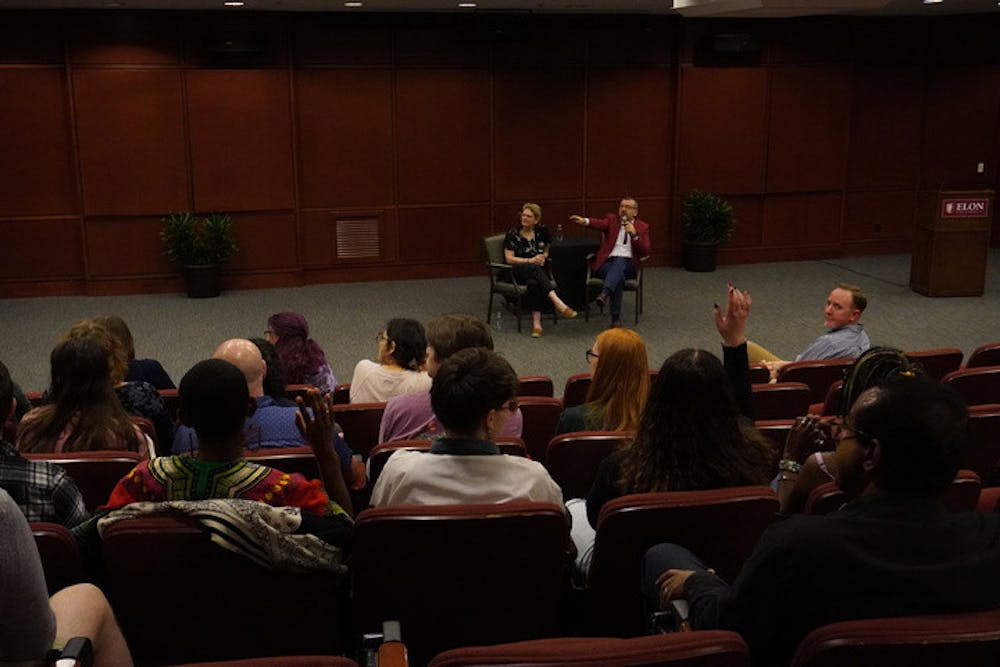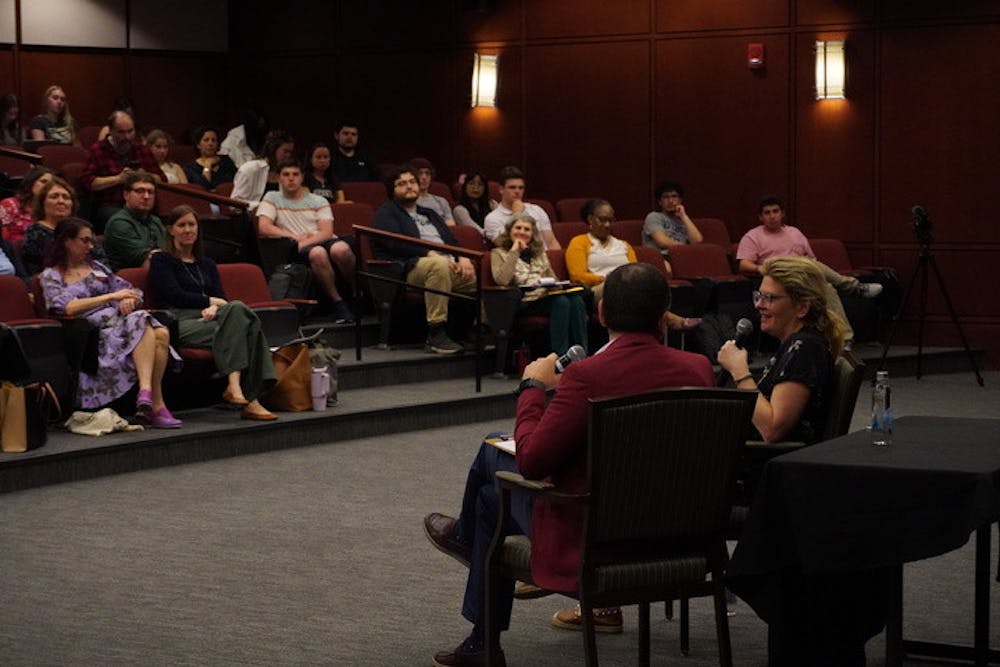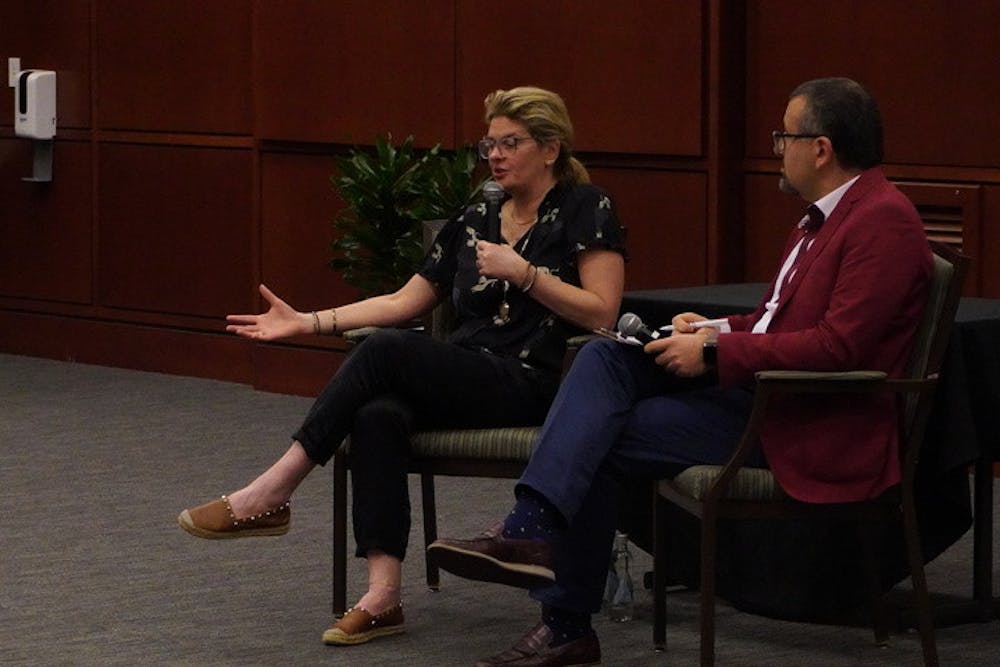Elon University hosted Mira Sucharov, professor of political science at Carleton University, on March 14 as part of Elon's initiative to promote discussion and foster understanding of the ongoing Israel-Hamas War.
Sucharov is a Canadian-Jewish scholar who is knowledgeable about Israel-Palestinian relations. She regularly contributes to the Canadian Jewish News, Ha'aretz and the Jewish Daily Forward. She is also the author of many books, including “Social Justice and Israel/Palestine.”
The event was called "Identity, Trauma, and Justice: The War between Israel and Hamas," and led by Baris Kesgin, Elon professor of political science and policy studies. Sucharov emphasized the importance of defining the terms people use in a discussion about the conflict between Israel and Hamas.
Sucharov’s discussion takes place two days after students joined together to march in solidarity and support of victims of oppression, many of whom carried signs referencing the perspective on oppression of Palestinians. Millions also gathered to protest the Israel-Hamas War on International Day of Action on March 2 in the cities of Asheville, Charlotte and Raleigh.
Earlier this academic year, Elon University’s multifaith chaplains hosted a panel to discuss the conflict and the grief surrounding it. There have been many other events throughout this academic year where Elon’s Jewish communities have come together to support and mourn the victims of the conflict.

Sucharov used an example during the event from a survey in which she sampled American, Jewish people about Zionism. Zionism is a movement for the re-establishment and protection of the Jewish nation in Israel. In the survey, the first question asked the participants if they were a Zionist without providing them a definition. Then, with the following questions, she gave them three different definitions of Zionism from various perspectives and asked the same question again. The last of the three definitions phrased the term from a Palestinian perspective. With this definition, Sucharov saw a significant decrease in the number of ‘yes’ responses.
“It went from 72%, right down to 10; only 10% of American Jews felt they were Zionist if you give them the definition that Palestinians take up,” Sucharov said.
Sucharov said she believes that the exponential changes in response to the question when you define the term “Zionist” is proof of the need to define terms specifically and carefully.
“Right there, that says so much for discourse and defining your terms, and that can help,” Sucharov said.
Another point Sucharov made throughout the evening is that discussing shared values and fears is essential to facilitate healthy dialogue with people or groups that may disagree. Then, the groups can engage in a conversation about policies.
"Start by articulating your values, and then say, ‘Do any of these values resonate with you? What are your values?’” Sucharov said. “Once you have common values on the page, or common fears, separate fears, ‘What do you worry about? What do you care about?’ Then you can start talking about policy and politics and solutions."
Senior Kara McKinley sat among the students who attended. McKinley said she found the discussion about needing to define terms particularly impactful.
"It's very easy to be hostile, and a lot of times, I think that disagreeing in the strongest way possible is necessary," McKinley said. "If your goal is to have a dialogue, then you should begin with common ground."
As a political scientist, Sucharov is well-versed in the potential solutions to conflict. One particular solution that she spoke about is the two-state solution. She highlighted an organization, "A Land For All," that supports what she believes is a viable solution to the current conflict.

"A Land For All" has a board made up of half Palestinians and half Israeli members who all have the goal to create a world in which Palestinians living in Israel can remain in Israel if they choose. This group also advocates for Palestinians to retain their ability to vote in the Palestinian government and vice versa.
Senior John Luke Farah said he enjoyed the discussion with Sucharov surrounding the potential for a two-state solution.
"I think the biggest takeaway for me today was talking about how to effectively bring peace to the land; we've talked a lot about what an ideal two-state solution would look like," Farah said. "Theoretically, and according to what the professor said in her own ideas, and I think that if we really want to, the solution that she proposed was one of mutual understanding of growth from both sides."
Elon sophomore Tess Trayner expressed their appreciation as a Jewish student for the opportunity to hear what Sucharov believed and engage in the discussion about this violence.
"It was really valuable for me to hear another Jewish voice," Trayner said. "A voice of authority, with a lot of scholarship behind her, speak and be very openly critical and honest about the things that Israel does."
Trayner also said they believe that, much like this event, the future of the conversation about Israel and Hamas cannot be one-sided.
"It wasn't black and white," Trayner said. "It wasn't one-sided, and I think that's where the future of this conversation needs to go."


